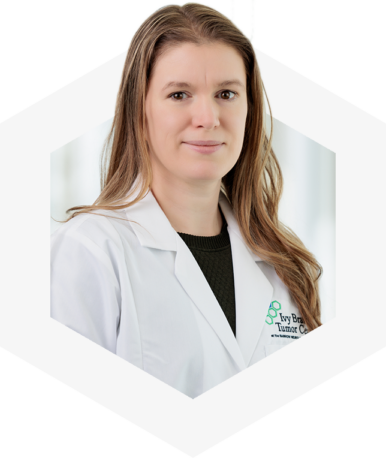
Kelly Braun, MD
Neuro-Oncologist
Dr. Kelly Braun approaches her role as a clinical neuro-oncologist at the Ivy Brain Tumor Center with expertise and compassion. Her training comes from notable institutions such as the Cleveland Clinic, where she completed a neurology residency and a neuro-oncology fellowship, and Rutgers University, where she earned a medical degree from the Robert Wood Johnson Medical School.
As a contributing author in several published articles, Dr. Braun is an expert in diagnosing and treating brain tumors. She is the recipient of many awards and accolades for research and leadership, including the Leadership for Women Scholarship and the Medical Student Prize for Excellence from the American Academy of Neurology. She is a member of the American Academy of Neurology and the Society for Neuro-Oncology.
Dr. Braun has the unique perspective of both a skilled clinician and a brain tumor patient. She was diagnosed with meningioma in her 20s and knows the intimate details of battling a brain tumor.
Dr. Braun recovered completely from her brain tumor and the surgery, radiation and neurological deficits that accompanied it. Her brain tumor experience influenced her decision to pursue a career in neuro-oncology and offers her a deep level of connection with her patients.
“There are multiple people at this institution who’ve had personal experiences with brain tumors. I think it brings more passion and purpose to what you do,” Dr. Braun says.
Q&A with Dr. Braun
What do you enjoy most about being a neuro-oncologist?
I enjoy interacting with patients. Once a patient has surgery, they typically go on to have radiation and see me for chemotherapy treatments. One of the nice things about being a neuro-oncologist is that I need to see patients frequently who are on active chemotherapy treatment. Seeing my patients often allows me to form a special relationship with them.
What is the biggest challenge in neuro-oncology?
Finding a cure for glioblastoma and other aggressive forms of brain cancer is by far the biggest challenge. It is difficult to have to tell patients that the best treatments we currently have will not be able to stop their cancer forever.
What does a successful day look like for you?
A successful day is when all of my patients who come in for follow-up appointments have tumors that are stable and not growing. When treatments look like they’re going in the right direction, that is a success.
What has changed most in the field of neuro-oncology in the past decade?
The FDA approved the Optune device to treat GBM, which is one of the tools that we commonly use. We are always learning more about molecular markers for tumor analysis, and we are becoming more personalized in our approach to treating brain tumors by finding out if specific mutations are associated with each patient’s tumor. We at the Ivy Center are working to discover and develop new drugs targeting these mutations. There is also a new guideline for classifying these tumors because of all those changes, so now we can be more precise with our pathological diagnosis of certain tumors because of these molecular markers.
What’s your goal in the next decade?
To continue working with patients in clinical trials and striving to find a cure for some of these aggressive tumors.
What have you learned from your neuro-oncology patients?
An important consideration of a patient’s treatment is its emotional and psychosocial components. When these patients go through treatment, they have fatigue, memory loss, depression and other issues. So there’s more nuance than what you might read about in a textbook.
How do you stay motivated in the face of these challenging brain tumors?
For me, the light at the end of the tunnel is clinical trials. Clinical trials provide hope. They give patients and families hope that one day we will find a cure for this tumor, but they also give us hope that we will discover positive results and finally make some progress.
